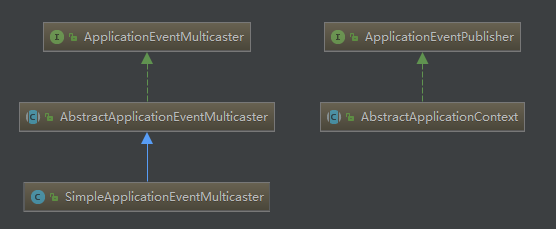Spring 事件原理
一、事件

自定义事件继承 ApplicationEvent 即可
二、事件监听者

SmartApplicationListener
三、事件发布者

1. ApplicationEventPublisher
- publishEvent(ApplicationEvent)
- publishEvent(Object)
1.1. AbstractApplicationContext
调用了 ApplicationEventMulticaster 中的 multicastEvent 方法来具体实现发布事件给监听者的操作
1 | protected void publishEvent(Object event, ResolvableType eventType) { |
2. ApplicationEventMulticaster
定义了对 ApplicationListener 的维护操作(比如新增、 移除等)
以及将 ApplicationEvent 多播给可用 ApplicationListener 的操作
- multicastEvent(ApplicationEvent)
- multicastEvent(ApplicationEvent, ResolvableType)
2.1. SimpleApplicationEventMulticaster
步骤:
- 调用父类中的 getApplicationListeners (ApplicationEvent, ResolvableType) 获取相关监听器
- 遍历并执行各个监听器
1
2
3
4
5
6
7
8
9
10
11
12
13
14
public void multicastEvent(final ApplicationEvent event, ResolvableType eventType) {
ResolvableType type = (eventType != null ? eventType : resolveDefaultEventType(event));
// 执行所有监听器
for (final ApplicationListener<?> listener : getApplicationListeners(event, type)) {
Executor executor = getTaskExecutor();
if (executor != null) {
executor.execute(() -> invokeListener(listener, event));
}
else {
invokeListener(listener, event);
}
}
}
2.2. AbstractApplicationEventMulticaster
步骤:
- 从缓存中取监听器集合(包括预加载的监听器)
- 若无则检索监听器并加入缓存
思考:
- 考虑并发(ConcurrentHashMap、synchronized)
- 利用 Map 进行缓存
- 对键和值分别进行包装(ListenerCacheKey、ListenerRetriever),可附加额外功能(可扩展性)
1
2
3
4
5
6
7
8
9
10
11
12
13
14
15
16
17
18
19
20
21
22
23
24
25
26
27
28
29
30
31
32
33
34
35
36
37
38
39
40
41
42
43
44
45
46
47
48
49
50
51
52
53
54
55
56
57
58
59
60
61
62
63
64
65
66
67
68
69
70
71
72
73
74
75
76
77
78
79
80
81
82
83
84
85
86// 使用 ConcurrentHashMap 对监听器进行缓存
final Map<ListenerCacheKey, ListenerRetriever> retrieverCache = new ConcurrentHashMap<>(64);
...
protected Collection<ApplicationListener<?>> getApplicationListeners(
ApplicationEvent event, ResolvableType eventType) {
Object source = event.getSource();
Class<?> sourceType = (source != null ? source.getClass() : null);
// 以事件类型和源类型作为缓存的键
ListenerCacheKey cacheKey = new ListenerCacheKey(eventType, sourceType);
// Quick check for existing entry on ConcurrentHashMap...
ListenerRetriever retriever = this.retrieverCache.get(cacheKey);
if (retriever != null) {
return retriever.getApplicationListeners();
}
if (this.beanClassLoader == null ||
(ClassUtils.isCacheSafe(event.getClass(), this.beanClassLoader) &&
(sourceType == null || ClassUtils.isCacheSafe(sourceType, this.beanClassLoader)))) {
// Fully synchronized building and caching of a ListenerRetriever
synchronized (this.retrievalMutex) {
retriever = this.retrieverCache.get(cacheKey);
if (retriever != null) {
return retriever.getApplicationListeners();
}
retriever = new ListenerRetriever(true);
// 检索监听器
Collection<ApplicationListener<?>> listeners =
retrieveApplicationListeners(eventType, sourceType, retriever);
this.retrieverCache.put(cacheKey, retriever);
return listeners;
}
}
else {
// No ListenerRetriever caching -> no synchronization necessary
return retrieveApplicationListeners(eventType, sourceType, null);
}
}
/**
* 根据给出的事件类型和源类型检索相关监听器
*/
private Collection<ApplicationListener<?>> retrieveApplicationListeners(
ResolvableType eventType, Class<?> sourceType, ListenerRetriever retriever) {
LinkedList<ApplicationListener<?>> allListeners = new LinkedList<>();
Set<ApplicationListener<?>> listeners;
Set<String> listenerBeans;
synchronized (this.retrievalMutex) {
listeners = new LinkedHashSet<>(this.defaultRetriever.applicationListeners);
listenerBeans = new LinkedHashSet<>(this.defaultRetriever.applicationListenerBeans);
}
for (ApplicationListener<?> listener : listeners) {
if (supportsEvent(listener, eventType, sourceType)) {
if (retriever != null) {
retriever.applicationListeners.add(listener);
}
allListeners.add(listener);
}
}
if (!listenerBeans.isEmpty()) {
BeanFactory beanFactory = getBeanFactory();
for (String listenerBeanName : listenerBeans) {
try {
Class<?> listenerType = beanFactory.getType(listenerBeanName);
if (listenerType == null || supportsEvent(listenerType, eventType)) {
ApplicationListener<?> listener =
beanFactory.getBean(listenerBeanName, ApplicationListener.class);
if (!allListeners.contains(listener) && supportsEvent(listener, eventType, sourceType)) {
if (retriever != null) {
retriever.applicationListenerBeans.add(listenerBeanName);
}
allListeners.add(listener);
}
}
}
catch (NoSuchBeanDefinitionException ex) {
// Singleton listener instance (without backing bean definition) disappeared -
// probably in the middle of the destruction phase
}
}
}
AnnotationAwareOrderComparator.sort(allListeners);
return allListeners;
}
